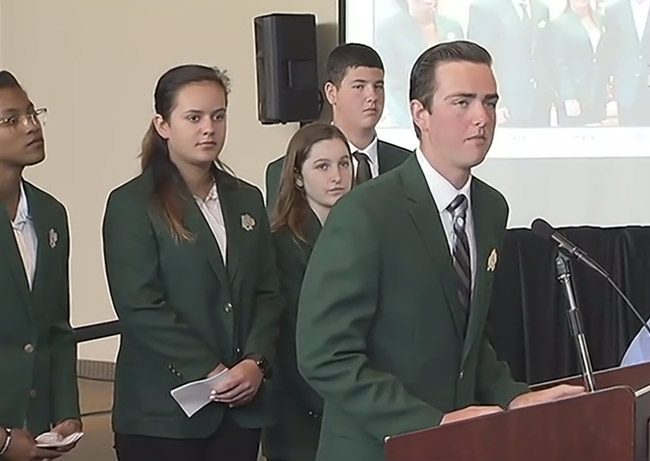
(© FlaglerLive via Florida Channel)
Six Flagler Palm Coast High School students who developed a resourceful and varied school-safety program for FPC, unique in the state, presented their plan to the Marjory Stoneman Douglas High School Public Safety Commission on Tuesday, the first school in the state to do so. They drew acclaim and commendations, particularly from Commission Chairman Bob Gulatieri, the Pinellas County Sheriff.
“When I learned about what’s going on in different parts of the state, one of the things that shines–and I thought it would be a good way to start this meeting on a very upbeat and positive note–and that is to hear from some students from Flagler County schools that have really taken significant ownership in school safety,” Gulatieri said half an hour into the meeting, after updating the commission on various developments since it had last met in January.
“These students at this high school in Flagler County have invested and taken ownership in making sure that they have a safe school and taken the initiative and developed their own program,” Gulatieri continued. “So I think that that’s one of the things that’s being done right . It’s really exciting to see these kids and the staff and the elected officials and everybody in Flagler County. They’ve really stepped up, and are an example and should be an example for all of Florida and what is right and what is good and how something good can come out of a very tragic situation.”
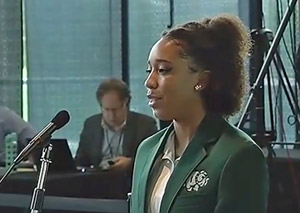
The students–Nicholas Blumengarten, Abbigail Carver, Gabrielle Jackson, Sydni Leon, Katia Martynuk and William Patin (two freshmen, two sophomores, two seniors)–developed their safety plan as part of a Community Problem Solvers project. (They were coached by Diane Tomko, FPC’s near-legendary problem solver maven. The students were also mentored by Winnie Oden, the district’s safety coordinator.)
Before they were done, the father of one of the murdered students at the Parkland school massacre last year, and a member of the commission, asked the FPC students if they’d be willing to bring their safety initiative to Marjorie Stoneman Douglas High School, and the state’s vice chancellor of education–who happens to have been a former principal at FPC–was asking them how they could scale their voice statewide. That would prove to be a recurring theme as commission members reacted to the presentation.
The Feb. 14, 2018 shooting at Marjory Stoneman in Broward County, where 14 students and three faculty members were murdered by a mass shooter, had created a swirl of policy debates and safety initiatives from the top down. But none organically from students themselves.
Community problem solvers’ initiatives are often framed by a question of social responsibility: “Does knowledge of an issue bring with it the responsibility to take action?” That question this year echoed with FPC’s own theme for 2019, a question posed to all students at the beginning of the year and since: “If not you, then who.”
“We said it’s going to be us,” the students of the Bulldog Patrol–as the six students call themselves–said.
So it’s been.
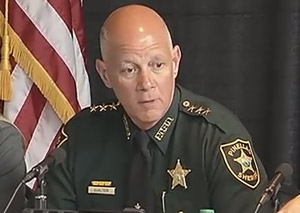
The team started by creating and distributing a school survey focused on safety issues that went to students, teachers and community members. Data from 400 responses gave the students a sense of why students felt safe–or didn’t–whether respondents felt there were enough drills, how safety could be improved.
“One of the questions from our survey that stood out to me was question nine,” Patin said, reading the question: “Do you feel comfortable going to an administrator/faculty/staff member when you learn about a threat?” The students were more comfortable than not. “That’s a very comforting thing for us because it’s important for the students to interact” with faculty, he said. He described an actual case of a threat that was reported at least in part because of the group’s work, which by then had become known.
To Jackson, the question that stood out was whether there were “any places on campus with easy accessibility for outsiders to enter without being seen.” The question also asked students to list points of entry they knew about. “This gave our district specific points that they could harden to make our campus safer,” Jackson said. Many of the students who filled out the survey listed weak spots.
But students stressed that the plan was no cookie-cutter. It was tailored for Flagler Palm Coast High School: “This plan was developed by students who walked the halls, who know our peers, and needed to have input in our school’s security plan. We have a voice, and we are advocates for ourselves and our peers,” Blumengarten said.
The group found that the school and the district had plenty of resources. “They just weren’t being brought together,” Patin said.
Then came the broader and longer-lasting parts of the plan. They created a school-based security council in order to ensure continuity after this particular group of students graduated. They established partnerships with almost a dozen individuals or groups at the school or beyond–administration, academies, law enforcement.
With a $1,000 grant from the security council they prepared and distributed 210 emergency first-aid kits to teachers, and a member of the school’s fire academy conducted first-aid training for teachers and staff (and more recently got a $3,000 grant from United Way to further that part of their program). They requested K-9 sweeps of the school, and they teamed up with the aeronautics flagship at FPC to develop a plan to use drones as “added surveillance” during high-traffic events such as pep rallies, thus providing a real-time feed. They developed a video public service message in cooperation with the school’s video production team and with a script vetted by the administration and the sheriff’s office. They sought out and got plenty of news coverage to disseminate their message.
In the near future they plan on doing a follow-up survey to see whether and how productive and effective the initiative has been. In June the students are presenting their work at the international competition of problem solvers in Massachusetts, after being declared grand champions in the senior division in state competition in Orlando last month.
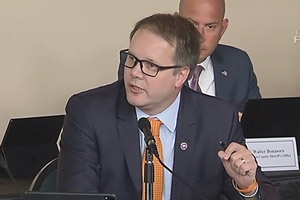
At the end of their presentation, each of the six read out a favored quote, ending with Patin’s “we are still students, and we are here to learn.” The commission listened and watched the students’ 25-minute presentation, among them Public Schools Chancellor Jacob Oliva, the former Flagler Superintendent, and behind them their own support group from Flagler: School Board member Janet McDonald, who described to the commission “how more than just a team of six incredible young people can inspire a whole school,” Superintendent Jim Tager (“Our students will shine for themselves,” he said. “I couldn’t be prouder of the students that are here before you today”) and Sheriff Rick Staly, who told commissioners they’d be “amazed like I was when they presented to me and the thought process and education that they went through on how to make their school safer.”
The commissioners were.
“Certainly you all are phenomenal,” Gulatieri said at the end of the presentation. “You’ve done great work and you are an inspiration to all.” But he didn’t leave it at that: just as with any presenters, the Bulldog Patrol was subjected to questions and comments from the commissioners. The patrol’s members showed themselves as poised without a script as they had been with notes in hand.
“I think you highlighted the importance of culture and climate on school campuses and that you can be the driver of change in making sure that your school is safe,” Max Schachter, a member of the commission and the father of Alex Schachter, one of the 17 murdered at the school, told the Bulldog Patrol. He had a question though: whether there was an anonymous reporting app available to students and others in the district. “I know we have statewide Fortify Florida but do you have one in your district.” There is none at the moment. But the district has a form on its website that students and others can fill out.
Schachter pressed the point, referring to the 30-some people who had prior knowledge that “the murderer was going to do this.” He asked what the most common way a similar threat would be communicated in Flagler.
“We actually did have one of those situations recently where there was a lot of social media posts about a threat at our high school, and a lot of them were actually being forwarded to our teachers,” Martynuk said, likely referring to last week’s SnapChat threat of a mass shooting by a 17-year-old FPC student with a disturbing history. “And from there our teachers were sharing it with school administration and law enforcement.”
Would you guys be open-minded to helping Marjorie Stoneman Douglas initiate a program there,” Schachter asked the students. He said he also intended to ask the state Department of Education whether it had “a program like this on a statewide level and if they’d be open-minded to launching something statewide, because culture and climate is extremely, extremely important.”
Gulatieri said the matter of helping the school should be left up to the Broward school district, but he asked Oliva–a former principal at FPC–to address the issue from the Department of Education’s perspective. “In my experience that I have in working with students,” Oliva said, “the secret formula that you have stumbled upon is the fact that students listen to students sometimes better than they listen to adults. So when we look at how we take a program like yours and use a term we like to refer to as ‘make it scalable,’ how can you help somebody like me that works at the state level connect your voice with other student voices so they can own the culture and the climate in their schools as well.”
A similar question had been asked of the Bulldog Patrol at state competition. The group is putting together a presentation to show other schools what process they could go through to create similar plans. “We want to let other people understand, not everyone is going to have the same resources as our school,” Patin said. “Not everyone is going to have the same types of issues and challenges that we have, but we want them to still be able to address it.”
The safety plan drew praise not just for the resourcefulness it reflected among students, but for the cooperation it spoke of between students and faculty, and between the school district and the sheriff’s office–a seamlessness not at all the norm across the state. Melissa Larkin-Skinner, a commission member, spoke of the tensions that had undermined many negotiations between governments and school boards in other counties as they debated how to slice the safety-dollar pie last year. That contrasted with Flagler’s experience. “I just want to commend the sheriff of Flagler County for his role in this,” she said. “And my hope is that everyone that’s involved as a partner can show every other community in Florida and across the nation what you’ve done and how it should be done in all of our counties.”
“I’m not often at a loss for words, but I can’t thank you enough for stepping up and doing what you’re doing,” commission member Ryan Petty, the father of Alaina Petty, another student murdered at the Parkland school, told the FPC students, “and setting an example for students around the state and around the nation.” He joked with the students that “you had me at drones, but there’s so much here, I really think you have a model that needs to be replicated across the state. The students have an important voice in driving safety.”
You can watch the full 40-minute presentation and Q&A session at the Florida Channel, starting at minute 30, here.
![]()




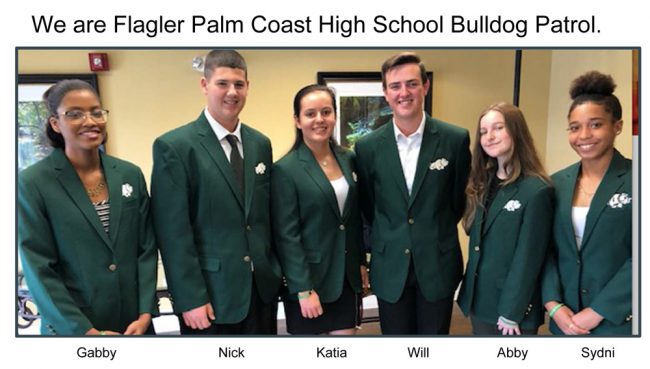

























Jane Gentile-Youd says
This is the best and most positive news to come from Flagler County In a long long time. What a super group of young adults. They deserve every recognition available and college scholarships for their genius and hard work.
Anita says
what an amazing team from FPC. Thoughtful, implementable and built on consensus. So. Sry proud of them and their potential impact across the state. GO. BULLDOG. PATROL.
Sue Dickinson says
I am so proud as a retired Flagler County School Board Member to see that Flagler Students have taken this very important topic “School Safety” and have put together a solid plan and that it has been implemented. Flagler schools has always had the resources willing to help and these students took it and excelled. The Future Problem Solving teams in Flagler have always been able to take the problem and find a solution. It warms my heart that School Safety rose to the top and was acted upon. My statement as a Board member of “It’s not a matter of IF it’s a matter of WHEN was alway my concern. It’s just like home security, make it so they go next door. Kudos to the students and Advisor’s.
Pete Celestino says
Nice to hear about the good things happening in Flagler Schools. Great job Bulldog Patrol.
atilla says
BRAVO BRAVO. These students deserve all the BRAVOS for their mature thinking and when somebody said [somebody should do something about this] they stepped up to the plate. Their parent must be very proud of them.
tulip says
What a refreshing sight to see young people actually trying to make things safer and better for not only the schools and the students, but for others also. A gazillion kudos to you all!!
Kia says
Very proud of our daughter Sydni & rest of FPC Bulldog Patrol Team! Being involved in something to help their school environment as well as others is a great thing! We pray these safety kits are never needed and that our schools as well as others are safe and secure to allow students and staff to focus on education and well being of our future!! We will keep fundraising so the team of 6 students can attend Internationals Future Problem Solvers competition this June. Proud of you all!!
Randy Jones says
CONGRATULATIONS to these young adults who chose to develop a way to protect their school. While other prominent groups are pushing for erosion of our God given right (as acknowledged by the U.S. Constitution) to self-protection these STUDENTS are actually doing something that CAN be done IMMEDIATELY. And yes, unguarded points of entry pose a one of the most significant threat to our students. From a “Pirate” dad, I am proud to say GO BULLDOGS!!!
eric needle says
What positive news. I love to see tomorrow’s leaders using creative problem solving to address real issues. Teaching critical thinking aimed at stuff we need to fix is brilliant. In fact, it’s exactly what we need to teach, and I think is missing in public education. FPSPI.org is an amazing organization that teaches kids to how think, not what to think. I wish more Florida schools would embrace their mission.